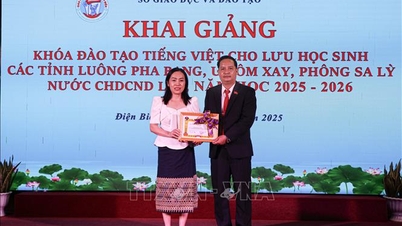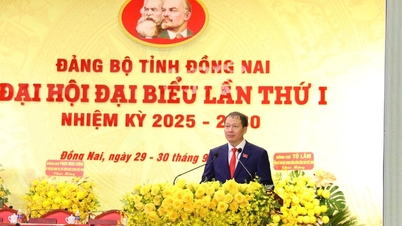When writing the book about the history of the formation of the national language, Dr. Pham Thi Kieu Ly and artist Ta Huy Long wanted to convey to readers, especially children, the love for Vietnamese - the beautiful language that we possess.
 |
| The exciting journey of the Vietnamese script |
According to the book, the journey of creating the Quoc Ngu script is the story of the development and popularity of the Latin script of the Vietnamese language. Initially, this script was a tool to facilitate communication with the Vietnamese people, thereby making it easier to carry out missionary work; later, it was used as a code between missionaries and the four religions and was only taught in seminaries.
After political and educational upheavals, Quoc Ngu gradually replaced Chinese characters in the country's administrative documents, playing the role of enlightening the people and becoming the official script.
What is special is that the book is written in semi-fictional comic language through the narration of Alexandre de Rhodes - a priest, a member of the Vatican, who came to Vietnam in the 17th century and had great merit in printing the first Vietnamese dictionary (Vietnamese - Portuguese - Latin Dictionary) in 1651.
The reason Dr. Pham Thi Kieu Ly chose Alexandre de Rhodes as the narrator is because this priest lived in both Dang Trong and Dang Ngoai, understood the customs and habits of both regions. He left behind many works, thanks to which there was data to build the plot for this book. In addition to adding dialogues with the main character's emotions, the author respected the main historical milestones and events that created the Quoc Ngu script.
Dr. Pham Thi Kieu Ly said that the content of this book is based on her PhD thesis on the history of grammar and Latin script of Vietnamese as well as documents in European archives and books about the missionary journeys. From the thesis of up to 640 pages, the author has shortened it into a short, concise book with vivid illustrations of 126 pages.
Talking about the book, the author affirmed: “Alexandre de Rhodes was not the first person to write Vietnamese in Latin characters. Before Alexandre de Rhodes, there was also Francisco de Pina - a Portuguese - who compiled a small dictionary, but it was lost. Priest António de Fontes was the first person to use the two letters “ơ” and “ư”, and found the tones to write in a report in 1631. He also compiled a Vietnamese - Portuguese dictionary for himself and other priests to learn Vietnamese”.
However, in that creative process, Alexandre de Rhodes was the one who gathered the works of his predecessors, combined with his knowledge of Annam to print the Vietnamese - Portuguese - Latin dictionary in Rome in 1651.
Thus, The Journey of the Creation of the National Language combines historical and scientific knowledge with the author's imagination to explain the birth of the current Vietnamese writing system. The group of authors also created a special interview with three prominent figures in the process of creating the national language system, Alexandre De Rhodes, Francisco De Pina and Gaspar do Amaral, discussing the process of creating the Latin script of the Vietnamese language.
The book incorporates many humorous details such as when Alexandre De Rhodes first came to Vietnam, due to a tone mistake, he mistakenly bought ca (fish) as ca (ca); because he did not know monosyllabic Vietnamese, the priests often wrote the words stuck together...
In addition to depicting Alexandre De Rhodes' journey of researching and creating the National Language script, the author has added a section called The National Language Chronicles, which records important milestones in the development of the National Language script from the 17th century, to the contributions of Vietnamese priests such as Filippe Binh, Mr. Pao, Mr. Ngan, Mr. Lien, etc.
That journey continued with the contributions of many other individuals who helped popularize the National Language in the South, then nationwide.
Through the book, readers will understand more about how the Quoc Ngu script was modified, popularized, and accepted over the years, how it contributed to eliminating illiteracy for our people during the French colonial period, and how it was recognized by President Ho Chi Minh as the official script of Vietnam since 1945.
Source: https://baoquocte.vn/hanh-trinh-ly-ky-cua-chu-quoc-ngu-290513.html



![[Photo] Solemn opening of the 12th Military Party Congress for the 2025-2030 term](https://vphoto.vietnam.vn/thumb/1200x675/vietnam/resource/IMAGE/2025/9/30/2cd383b3130d41a1a4b5ace0d5eb989d)
![[Photo] The 1st Congress of Phu Tho Provincial Party Committee, term 2025-2030](https://vphoto.vietnam.vn/thumb/1200x675/vietnam/resource/IMAGE/2025/9/30/1507da06216649bba8a1ce6251816820)
![[Photo] President Luong Cuong receives President of the Cuban National Assembly Esteban Lazo Hernandez](https://vphoto.vietnam.vn/thumb/1200x675/vietnam/resource/IMAGE/2025/9/30/4d38932911c24f6ea1936252bd5427fa)
![[Photo] Panorama of the cable-stayed bridge, the final bottleneck of the Ben Luc-Long Thanh expressway](https://vphoto.vietnam.vn/thumb/1200x675/vietnam/resource/IMAGE/2025/9/30/391fdf21025541d6b2f092e49a17243f)
![[Photo] General Secretary To Lam, Secretary of the Central Military Commission attends the 12th Party Congress of the Army](https://vphoto.vietnam.vn/thumb/1200x675/vietnam/resource/IMAGE/2025/9/30/9b63aaa37ddb472ead84e3870a8ae825)

































































































Comment (0)